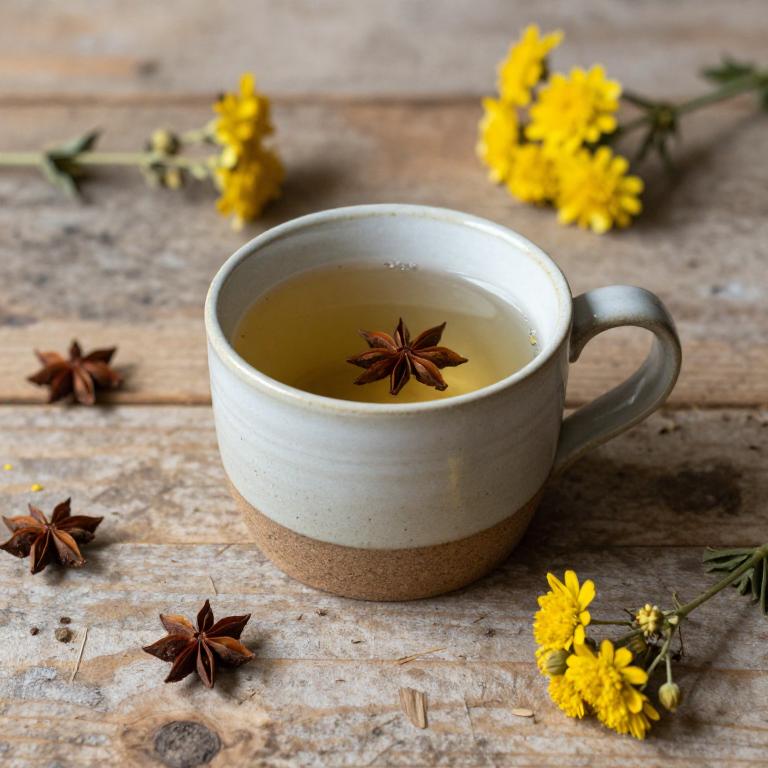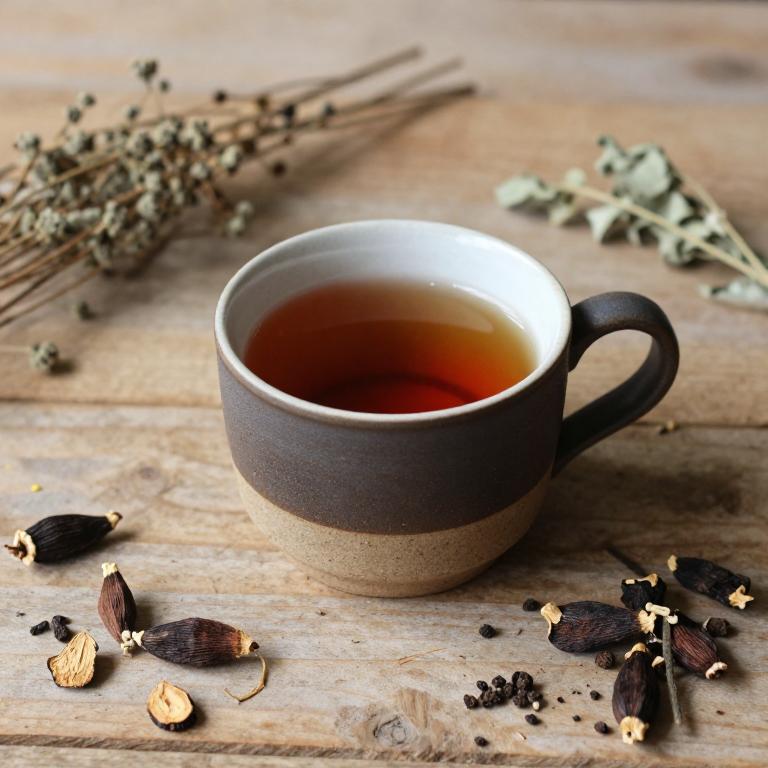10 Best Herbal Teas For Stomach Cramps

Herbal teas can be an effective natural remedy for relieving stomach cramps due to their soothing and anti-inflammatory properties.
Chamomile tea is particularly popular for its calming effects on the digestive system, helping to reduce spasms and ease discomfort. Peppermint tea is another beneficial option, as it can relax the muscles in the gastrointestinal tract and alleviate cramping. Additionally, ginger tea is known for its ability to settle the stomach and reduce nausea often associated with cramps.
For best results, it's recommended to drink these teas warm and in moderation, while also staying hydrated and avoiding excessive caffeine or spicy foods.
Table of Contents
- 1. Fennel (Foeniculum vulgare)
- 2. Cumin (Cuminum cyminum)
- 3. Chamomile (Matricaria chamomilla)
- 4. Anise (Pimpinella anisum)
- 5. Thistle (Silybum marianum)
- 6. Ginger (Zingiber officinale)
- 7. Dog rose (Rosa canina)
- 8. Stinging nettle (Urtica dioica)
- 9. English lavender (Lavandula angustifolia)
- 10. Black pepper (Piper nigrum)
1. Fennel (Foeniculum vulgare)

Foeniculum vulgare, commonly known as fennel, is a herb widely used in herbal teas to alleviate stomach cramps due to its carminative and antispasmodic properties.
The essential oils in fennel, particularly anethol, help relax the smooth muscles of the gastrointestinal tract, reducing spasms and easing discomfort. Drinking fennel tea can also aid in digestion and relieve bloating, making it a popular remedy for digestive issues. It is often prepared by steeping the seeds in hot water and can be consumed warm, either on its own or combined with other soothing herbs like ginger or peppermint.
While generally safe, it is advisable to consult a healthcare professional before using fennel tea, especially for prolonged use or in individuals with certain medical conditions.
2. Cumin (Cuminum cyminum)

Cuminum cyminum, commonly known as cumin, is a popular herb used in herbal teas to alleviate stomach cramps due to its carminative and anti-inflammatory properties.
The essential oils in cumin, such as limonene and cumin aldehyde, help relax the smooth muscles of the gastrointestinal tract, reducing spasms and discomfort. Drinking cumin tea can also aid in digestion by stimulating the production of digestive enzymes and reducing bloating. It is often recommended for individuals experiencing gas, indigestion, or menstrual cramps.
However, it is important to consult a healthcare provider before using cumin tea, especially for those with existing medical conditions or who are pregnant.
3. Chamomile (Matricaria chamomilla)

Matricaria chamomilla, commonly known as chamomile, is a popular herbal tea used for its calming and soothing properties.
It is widely recognized for its ability to alleviate stomach cramps due to its anti-inflammatory and antispasmodic effects. The tea contains compounds like apigenin, which help relax the smooth muscles of the gastrointestinal tract. Chamomile tea is often recommended for individuals suffering from indigestion, bloating, or menstrual cramps.
To prepare it, simply steep a few chamomile flowers in hot water for several minutes, and enjoy it warm for best results.
4. Anise (Pimpinella anisum)

Pimpinella anisum, commonly known as anise, is a traditional herbal remedy often used in herbal teas to alleviate stomach cramps.
The seeds of this plant contain compounds like anethole, which have carminative and antispasmodic properties that help relax the muscles in the digestive tract. When brewed into a warm tea, anise can soothe bloating, gas, and cramping by promoting the release of trapped gases and easing intestinal spasms. It is frequently combined with other herbs like fennel or ginger to enhance its digestive benefits.
However, individuals with allergies to related plants or those on certain medications should consult a healthcare provider before using anise tea regularly.
5. Thistle (Silybum marianum)

Silybum marianum, also known as milk thistle, is a herbal remedy commonly used in the form of tea to support digestive health.
This herb contains compounds like silymarin, which are believed to have anti-inflammatory and antioxidant properties that may help alleviate stomach cramps. When brewed into a tea, silybum marianum can soothe the gastrointestinal tract and reduce irritation, making it a popular choice for those experiencing digestive discomfort. However, it is important to consult a healthcare provider before using it, especially if you have underlying health conditions or are taking medications.
While some people find relief from stomach cramps with milk thistle tea, individual responses may vary, and it should not replace professional medical advice.
6. Ginger (Zingiber officinale)

Zingiber officinale, commonly known as ginger, is widely used in herbal teas to alleviate stomach cramps due to its anti-inflammatory and carminative properties.
The active compounds in ginger, such as gingerol and shogaol, help relax the gastrointestinal tract and reduce muscle spasms, making it effective for digestive discomfort. Drinking ginger tea can also help soothe nausea and ease bloating, common symptoms associated with stomach cramps. To prepare the tea, fresh or dried ginger root is typically steeped in hot water for several minutes.
Regular consumption of ginger herbal tea may provide natural relief for mild to moderate stomach cramps without the side effects of over-the-counter medications.
7. Dog rose (Rosa canina)

Rosa canina, also known as rosehip, is a popular herbal remedy often used in teas to alleviate stomach cramps due to its anti-inflammatory and digestive properties.
The tea is rich in vitamin C, antioxidants, and bioflavonoids, which can help reduce intestinal inflammation and ease discomfort. It is typically prepared by steeping dried rosehips in hot water, and it is often consumed warm to soothe the digestive system. Many people find that drinking Rosa canina tea regularly can help manage symptoms of irritable bowel syndrome or other digestive disorders.
However, it is advisable to consult a healthcare professional before using it, especially if you have underlying health conditions or are taking medications.
8. Stinging nettle (Urtica dioica)

Urtica dioica, commonly known as stinging nettle, is a medicinal plant that has been used for centuries to address various health concerns, including stomach cramps.
When prepared as a herbal tea, stinging nettle can help soothe digestive discomfort due to its anti-inflammatory and antispasmodic properties. The tea is typically made by steeping dried leaves in hot water, and it is often consumed warm to enhance its calming effects on the gastrointestinal system. Rich in minerals such as magnesium and potassium, stinging nettle tea may also support overall digestive health and reduce bloating.
However, it is advisable to consult a healthcare professional before using it, especially for individuals with known allergies or chronic health conditions.
9. English lavender (Lavandula angustifolia)

Lavandula angustifolia, commonly known as English lavender, is often used in herbal teas to alleviate stomach cramps due to its calming and antispasmodic properties.
The essential oils in lavender, particularly linalool and lavandins, help relax smooth muscle tissue in the digestive tract, reducing tension and discomfort. When brewed as a tea, lavender can soothe the gastrointestinal system and ease symptoms such as bloating and cramping. It is typically consumed warm, often combined with other calming herbs like chamomile or peppermint for enhanced relief.
While generally safe, it is advisable to consult a healthcare professional before using lavender tea, especially for prolonged or severe stomach issues.
10. Black pepper (Piper nigrum)

Piper nigrum, commonly known as black pepper, is often used in herbal teas to help alleviate stomach cramps due to its warming properties and digestive benefits.
The active compound in black pepper, piperine, may enhance digestion and reduce bloating, which can contribute to easing discomfort. When brewed into a tea, black pepper can stimulate the digestive system and promote the secretion of digestive enzymes. However, it is important to use it in moderation, as excessive consumption may irritate the stomach lining.
Overall, piper nigrum herbal tea can be a gentle and natural remedy for mild stomach cramps when consumed appropriately.